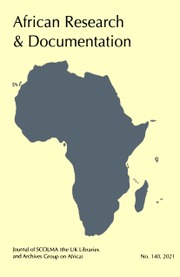Article contents
At the Margin - African Endangered Languages in the Context of Global Endangerment Discourses
Published online by Cambridge University Press: 25 April 2022
Extract
According to estimates, Africa hosts about 2,000 of the approximately 6,000 languages of the world. This number makes the continent one of the hotspots of linguistic diversity. Essential description (i.e. grammars, dictionaries) and documentation (i.e. audio and video speech data and their annotations) is not even available for some of the largest among them. The overwhelming majority of African languages, irrespective of their endangerment status, have received only very little or no linguistic attention to date, despite the fact that many of them are spoken by millions as a first or second language. In addition, a large number of African languages are spoken by small-scale rural communities and can be classified as endangered on diverse grounds, ranging from displacement due to wars or climate change to rural exodus for socioeconomic reasons.
Information
- Type
- Articles
- Information
- Copyright
- Copyright © International African Institute 2009
Footnotes
The research reported in this paper was funded by grants from the Max Planck Society for the Advancement of Science, the Endangered Languages Documentation Programme and the Arts and Humanities Research Council, whose support is gratefully acknowledged. I am indebted to Julia Sallabank, Maarten Mous and the audiences of the SCOLMA conference 2008 and the ELAP workshop on ideologies and beliefs on endangered languages in February 2009 for comments and suggestions, and to Marina Chumakina and Anne Schumann for practical support. My gratitude also extends to the speech communities whose experiences I had the privilege to share. The responsibility for any misrepresentation lies of course exclusively with me.
References
- 29
- Cited by

